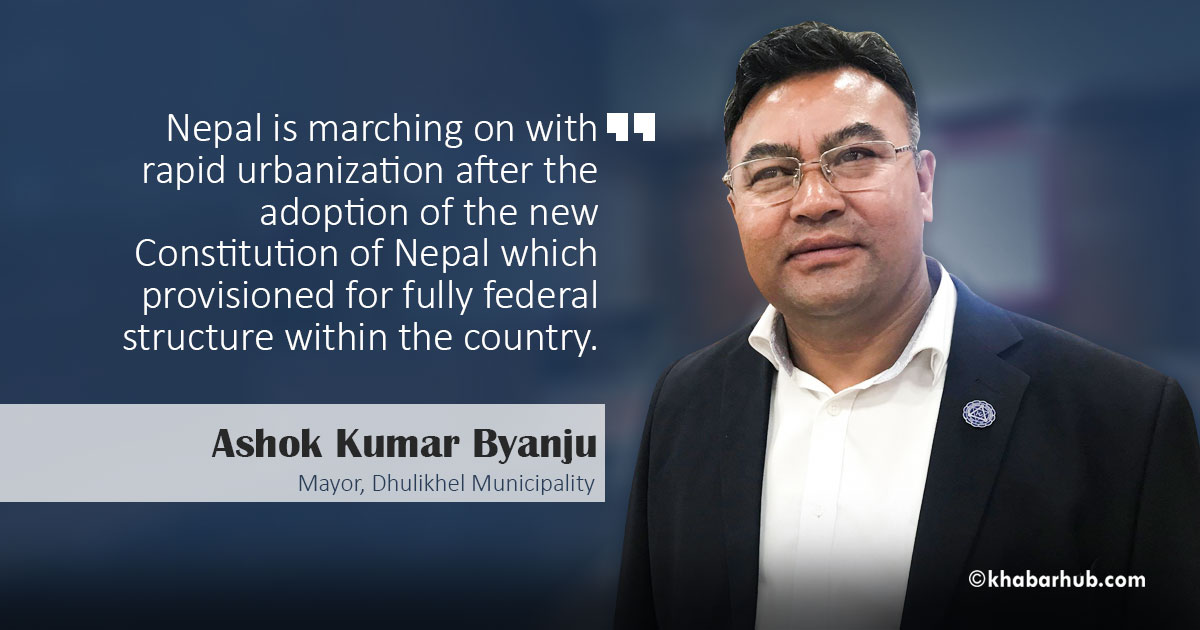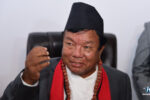After the elections at the local level and setting up of provincial governments, the federal structure of the present the government is fully operational. What role does a local Government in overall federal structure play in bringing overall development of the country? A team of Khabarhub approached Mayor of Dhulikhel Municipality Ashok Byanju, who is currently holding the post of the Chairman of Nepal Municipality Federation – an umbrella organization of 293 municipalities and also the Vice-President of International Federation of Municipalities. He explained in a precise manner how the municipality has an important role to play in bringing development at the local level. Excerpts:
Xi’an – a large city and capital of Shaanxi Province in central China is of special mention here because you have visited the Xi’an municipality. In such a period of time, Xi’an has made remarkable development. Can it be replicated in Nepal? What did you learn from there?
The success of Xi’an lies in the perfect execution of the development plan without posting any delay. I think the municipality of Dhulikhel can take benefit from there in areas of making a region-specific plan, preparation for execution of the plan and then full execution of the planned model.
Did you sign any accord (or agreement) with Xi’an municipality?
Actually, it was an exchange of experiences between two municipalities – Dhulikhel of Nepal and Xi’an of China. We shared our experiences regarding problems, challenges, and future visions. Both the municipalities established a fraternal relationship to explore shared opportunities together.
For example, Xi’an municipality has promised to play a greater role in the development of Dhulikhel municipality by providing scholarship to students and extend logistic and technical help in developing tourism in the area.
We had an extensive talk with the other officials of Xi’an municipality regarding devising a blueprint of urbanization of a region while developing a region. We studied their style of work right from Mayor down to manual staff and learned from their commitment to work. We shall definitely replicate the model in Dhulikhel and other municipalities across the country.
You are also holding the two other positions – President of the Nepal Municipalities Federation and the Vice-President of International Federation of Municipalities. What benefits will Nepal municipalities will have due to your stature and positions you are holding at this moment?
Without any doubt, Nepal is marching on with rapid urbanization all around after the adoption of the new Constitution of Nepal which provisioned for fully federal structure within the country. We need to strengthen the urban workforce, urban economy, urban technology urban town planning.
For doing all that, it is imperative for us to learn from the experiences of the different countries around the world. How did towns and cities in developed countries grow to become self-sufficient? We need to adopt all the essentials proposed by UNO (United Nations Organization) regarding urban area development and also take the lessons from the experiences of the developed countries.
You know that we have a good number of age-old towns in Nepal and at other parts of the countries new towns are also coming up. We are also in the process of launching the project of smart cities. For all these things to happen in reality we are required to take help from the international community.
I am doing my best to link Nepal with international organizations so that our municipals across the country can learn from the international experiences how to promote connectivity and develop it at different levels in areas transport and communication which have a direct bearing on health, education, food, drinking water, and others.
Local bodies are not working for the welfare of people as it is being alleged by common citizens of Nepal. How do you respond?
Just compare the budgetary expenditure at the federal, provincial and local level. What do you find? Local governments have spent 73/74 percent of the total budget provided to them. However, there are a few municipalities which are new with fewer numbers of staff. I accept there may have been some weaknesses with them but barring these stray cases local governments in Nepal are very strong.
Where do you think the problem lies?
You see elections of local bodies took place after long 17 years. Restructuring of local bodies is underway. Different geographies have come at a place; the different level of staff has come at a place. This is why we are undergoing a restructuring in terms of work and overall plan. So, the problem may arise; I agree. However, if you comparatively analyze, I am sure you cannot say nothing has happened.
It is the local body that brings democracy to every house and knocks at the doors of every individual. Local bodies remain in constant touch with the people and foreground the development works directly benefiting the people. Thus, local bodies directly take part in all the endeavors of bringing sustainable development of Nepal.
Provincial governments and the federal government must take note of it. Otherwise, it will dent our efforts to bring lasting development in the country. Without local bodies in perfect functional health, the delicate balance at all the three levels of government will be disturbed and federal structure will fail to deliver fruits of development to people.
On your part, you have been duly playing the role of President of Nepal Municipality Federation in solving the functional disharmony among the municipalities across the country. Am I right, sir?
Nepal Federation of Municipalities under my leadership take care of their demands and engage itself in lobbying with the higher leadership at provincial and federal governments. The problems and challenges of all the 293 municipalities are taken by this federation for amicable resolution through national and international networking and proposing the legislative action by making Laws.
There are areas of work which cannot be performed all alone by the local body. In a situation like this, all the three governments functioning at three tiers come together to cooperate with each other in order to deliver development to the people.
What kind of projects and programs Dhulikhel municipality are you working on at present?
Dhulikhel municipality at present is working on projects of tourism, education, health, agriculture, and urban development infrastructure. Our first priority is to build infrastructure – both soft and hard. We are working on providing drinking water facility to each house in Dhulikhel municipality by adopting the slogan – ‘one house one tap’. Projects for increasing the agricultural yield are underway. Tourists can visit every part of Nepal but we are trying to build a specific city for tourism.
Dhulikhel municipality has undertaken different types of projects for removing poverty from this region. Poverty elimination program is our topmost priority. We are identifying the poor people here for giving them a range of skills so that they can work for others or for themselves to earn a livelihood and build their own capital. Dhulikhel municipality always stands for its residents all the time.









Comment